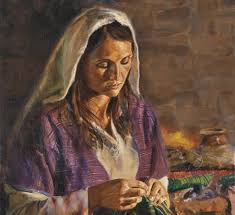Dorcas
Her name means: “Gazelle”; “Tabitha” Is Its Hebrew Equivalent
Her character: An inhabitant of Joppa, a town on the Mediterranean coast, thirty-five miles northwest of Jerusalem, she belonged to one of the earliest Messianic congregations. She was a disciple known for her practical works of mercy.
Her sorrow: To have suffered a grave illness.
Her joy: To serve Yeshua (Jesus) by serving the poor.
Key Scriptures: Acts 9:36-43
Her Story
The winds roared over the coast, piling water in noisy heaps along the rocky shoreline. But though she lay quietly in the upper room of her house near the sea, Dorcas did not hear them. Nor did she notice the waves of grief that spilled into the room from the heart of every woman present. For once she had nothing to offer, no word of comfort, no act of kindness to soften their suffering. Instead, she lay still as other women ministered to her, tenderly sponging her body clean to prepare it for burial.
As Peter approached the house, he could hear the noise of mourning, a sound more desolate than the tearing wind. Two men had summoned him from Lydda, where he had just healed a paralytic. They urged him to come quickly because one of the Lord’s disciples in Joppa had died. He had come in haste, hoping to reach Dorcas before she had to be buried.
As soon as he entered the room where her body lay, the widows surrounded him with tangible evidence of the woman they had loved, weeping as they held up robes and other items Dorcas had sewn to clothe the poor. Quickly, Peter shooed them from the room, as though to clear the atmosphere of despair. Then he knelt beside her body.
As Peter prayed, he remembered a promise Yeshua had made: “I tell you the truth, anyone who has faith in me will do what I have been doing. He will do even greater things than these, because I am going to the Father.” His faith rising like the wind outside, Peter addressed the dead woman, saying, “Tabitha, get up.” Taking her by the hand, he actually helped her to her feet.
The next day, Dorcas stood alone on the roof of her house. The shore was littered with driftwood, trinkets from yesterday’s storm. She breathed deeply, inhaling the sea’s salty tang, soothed by the sound of waves lapping the rocks below. Strangely, the view looked somehow transparent, as though another world waited just behind the curtain of this one. Dorcas shaded her eyes with her hand, peering out at the sea. But she saw nothing other than the usual collection of fishing boats bobbing in the waves.
Sighing, she turned and went inside. She had things to do—clothes to sew, bread to bake, the poor to feed and clothe. But even in the midst of her busy preparations, her longing for that other world increased, like hunger pangs before a feast. She fed that longing with her many practical acts of love.
Though we don’t know what went through Peter’s mind as he knelt and prayed at Dorcas’s bedside, we do know that Yehovah God worked through him in an extraordinary way. And though Scripture doesn’t tell us how Dorcas responded to her incredible experience, it doesn’t take much to imagine her joy. The story of her miracle spread throughout Joppa, leading many to believe.
Her Promise
Yehovah God is glorified in the story of Dorcas, not only in her being raised from the dead, but through her acts of kindness, her generosity, and her willingness to go out of her way to offer help to others. Don’t think you must do great and noble and noticeable acts for your life to glorify God. He will be glorified through your simple acts of love and obedience, whatever they are, wherever you are.


0 Comments